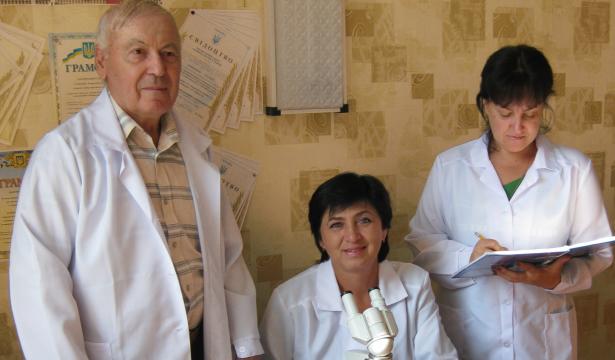Direction – Applied genetics
-
 Head in the direction
Head in the direction
Chief ScientistSAMOVOL Oleksiy Petrovych,
Dr. Sci (Agr.), Senior ResearcherScientific profile:
SCOPUS
GOOGLE SCHOLAR
ORCID
WEB OF SCIENCE
SUMMARY -
 COLLECTIVE LABORATORY
COLLECTIVE LABORATORY
- improve and develop new elements of the theoretical foundations of introgressive selection of Solanaceae vegetables and melons species that provide practical management processes of transformation potential geno-typic variability in the free and available criteria;
- classic improvement and development of new and innovative methods of forecasting capabilities at an early stage of plant ontogenesis F1 (meiosis) for state of recombination and genotypic variability in the geterogeneous structure of segregating populations;
- scientifi c methods of fundamental and applied research of induced recombinogenesis and mutagenesis, and gametes and zygotes selection in Solanaceae and Cucurbitaceae species.
Already received scientifi c-methodological research how new and additional elements of the theoretical foundations of recombination and mutational breeding, consisting of a series of identifi ed eff ects on vegetable and mel-on kinds of plants:
- «the eff ect of low adapted heterozygote’s F1»;
- «the eff ect of vertical depends in the manifestation of genotypic variability spectrum»;
- «the eff ect of interstitial chiasm»;
- «longing eff ect of natural selection»;
- «the eff ect of reducing the elimination of the action of natural gamete and zygote selection»;
- «the eff ect of homogenizing of segregating populations and homozygotisation of rec-genes»;
- «the eff ect of consistent growth of heterozygosity in interspecifi c hybrids F1»;
- «the eff ect of meha-fenn control of quantitative traits», as well as «the eff ect of gene conversion».
Developed by:
- method of prediction recombination spectrum and genotypic variability in segregating heterogeneous popula-tions;
- method of prediction of the heterosis eff ect of early crop plans of hothouse hybrids F1 of tomatoes;
- method of temporary horizontal tearing of selection;
- method of vertical natural selection;
- method of gametophyte and sporophyte selection;
- way to create original material for breeding early ripening, highly productive varieties of tomatoes;
- way to increase range of genotypic variability;
- way to improve and expand the range recombination genotypic variability;
- way to create original material for breeding of tomatoes;
- method of selection hybrids of watermelon with high performance commodity;
- biological techniques: «Processing of buds hybrids F1 of glycosides»; «Reciprocal crossing»; «Pollination of buds hybrids F1 limited number of pollen»;
- a method of obtaining many marker mutant forms of tomato;
- a method for obtaining mutant forms of a tomato with gene male sterility;
- technology: «Creation of breeding lines with genetically controlled sterility and early maturing lines with high potential and performance» (based on induced mutagenesis); «Creation of breeding lines with low and high recombination tendency for the future to obtain hybrids F1 respectively as a goal and a means of selection» (based on induced recombinogenesis); «Creation of breeding lines that are resistant to high temperatures and low positive» (based on gamete and zygote selection).
Proposals for scientists:
- consultation with the practical application of technologies modifi ed classical methods induced mutagenesis and recombinogenesis, and new technologies of unconventional methods;
- advice on technology selection transgressive and introhressive of tomatoes lines with new germplasm by inter-species complex of combination of agronomic characteristics.
1. Samovol O.P., Kondratenko S.I., Mogilnaya E. (2021). Variability of meiotic recombination and cytological parameters in F1 tomato hybrids under extreme environmental conditions. Bulg. J. Agric. Sci., 27 (2), рр. 342–349. (Scopus, Web of Science)
2. Kondratenko S.I., Pasternak T.P., Samovol O.P., Mogilna O.M., Sergienko O.V. (2020). Modeling of asymmetric division of somatic cell in protoplasts culture of higher plants. Regulatory Mechanisms in Biosystems, 11 (2). doi: https://doi.org/10.15421/022038 (Web of Science)
3. Mogylna O., Samovol O., Kondratenko S., Sergienko O., Suchkova V., Bedoshvili D. (2020). Cytogenetic Features of Meiosis in Hybrid F1 Watermelon (Citrullus lanatus (Thunb.) Matsum et. Nakai), Depending on the Level of Ontogenesis Adaptation. Bulletin of the Georgian National Academy of Sciences, vol. 14, no. 4. (Scopus)
4. Samovol O. P., Kornienko S. I., Kravchenko V. A., Kondratenko S. I. (2017). Change of Mendelian ratios and meiotic recombination parameters in F1 hybrid tomatoes under the influence of ?-irradiation. Cytology and Genetics. Vol. 51, No. 4, pp. 247-252. (Scopus)
5. Самовол О. П., Кондратенко С. І. Томат (генетичні основи селекції) : монографія. Вінниця : ТОВ "Нілан-ЛТД", 2018. 448 с.
6. Рівень адаптивного потенціалу ліній кабачка за ознаками продуктивності. / С. І. Кондратенко, О. В. Сергієнко, О. П. Самовол, Р. В. Крутько, Ю. М. Ланкастер. Наукові доповіді НУБіП України. (Сер. “Агрономія”). 2020. Вип. № 1 (83). DOI: http://dx.doi.org/10.31548/dopovidi2020.01.004
7. Стабільність прояву біохімічних ознак плодів кабачка за різних умов вирощування лінійного матеріалу. / Авт. кол. : С. І. Кондратенко, Т. В. Шевченко, О. В. Сергієнко, О. П. Самовол, Ю. М. Ланкастер. Рослинництво і ґрунтознавство. 2020. Vol. 11 (3). С. 70–79.
8. Самовол О. П., Кондратенко С. І., Могильна О. М. Вплив високогірних екологічних умов на мінливість рекомбінаційних і цитологічних пераметрів мейоза у гібридів F1 томата. Овочівництво і баштанництво : міжвідомчий тематичний науковий збірник. 2021. Вип. 69. С. 22–35.
9. Методичні рекомендації з оптимізації мутаційної селекції томату (L. esculentum Mill.) / О. П. Самовол, О. М. Могильна, С. І. Кондратенко, Т. В. Мірошніченко. Вінниця : ТОВ "ТВОРИ", 2020, 32 с.
Phone +380577489191 secretary
e-mail: ovoch.iob@gmail.com

